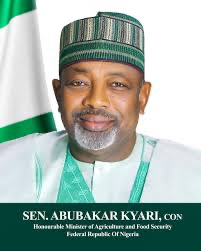The Federal Government has sought more support and assistance of the United Nations Systems in its quest to achieve food security in the country.
Senate Abubakar Kyari, Minister of Agriculture and Food Security, stated this in Abuja when Dr. Amina Mohammed, United Nations Deputy Secretary-General to Nigeria visited the headquarters of the Ministry to discuss the mutual partnership Nigeria has with the United Nations in the Agriculture and Food Security Sector.
Kyari said: “As you know, with our large population and growing demand for food security, Nigeria’s partnership with the United Nations is critical to meet the attendant huge consumption demand in the immediate and long-term Plan of Action.
“Your Excellency, the Ministry is totally committed to providing the desired policy direction to steer the agriculture and food security sector.”
He stated that the Ministry has begun partnership with Food and Agriculrure Organisation(FAO) and World Food Programme(WFP) to conduct the National Agricultural Census for overall development of the Nigerian agriculture.
Kyari revealed that the UN through the UNICEF is providing support to the Nigerian food and nutrition security agenda, notably, by fortification of food crops (vitamins, anti-bodies),with a view to mitigating stunted growth, malnourishment and other infant nutrient deficiencies.
The Minister said the UN organisations have over the years provided technical assistance to Nigeria in ensuring food systems and nutrition security.
He, however, requested more support and assistance from the United Nations.
He said: “Currently, the Ministry would appreciate further support on the Value Chain Development Programme, Value Chain North targeted at increasing food production in the northern part of Nigeria.
“The Livelihood Improvement Family Enterprises Project – Niger Delta (LIFE – ND), a project by IFAD is to enhance “Income, food security and job creation for rural youth and women through agribusiness development enhanced on a sustainable basis” the Project is focusing on unemployed and underemployed rural youths (aged 18-35) and women headed household with children below 15 years willing to engage in the production, processing, and marketing of selected commodities.
“The project is targeting 50% male and 50% female participation.
“IFAD also has the Special Agro-Industrial Processing Zones (SAPZ) Programme which seeks to support inclusive and sustainable Agro-|Industrial Development in Nigeria, aimed at diversifying Nigeria’s economy through Agriculture and reduction of food import bill.
“Your Excellency, your visit to the FMAFS-Nigeria is apt and timely to create a new paradigm shift that will further improve the agriculture sector with food systems, the UN transformation pathway and request to establish stronger partnership to strengthen the existing cooperation and make projects for new ties for sustainable development.
“We must rise to the occasion and invest massively in agriculture leveraging the UN Sustainable Development Goals (SGDs) 1 and 2 which you could use your global influence to explore opportunities for Nigeria to create jobs, diversify the economy and reduce food imports.”
In her remarks, Dr. Amina Mohammed, assured that the UN would assist Nigeria with more sense of urgency, while
advising the Nigerian government to invest resources where it matters most as that is the only way to attract external assistance.
According to her, “Whatever support we will be giving will be building on what we are already doing.
“Sure, we are going to support the government but much is expected from the government. When we see what the government is doing, we will know how to come in.”
She identified the issues of climate change, insecurity, inadequate financing and effects of COVID-19 pandemic as some of the challenges militating against food productivity in the country.
She underscored the need for Nigeria to focus attention on ensuring food security for her citizenry, adding that without decent food security and nutritious food systems, that the health of Nigerians would be significantly affected.
While stressing the need for strong institutions to drive agricultural activities, Mohammed pledged the support of the United Nations System to mitigate the impact of climate change in agricultural production.

